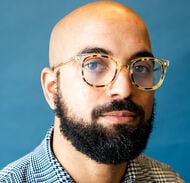We Need to Talk About Identity
After a tragedy, we felt determined to provide students and the community with a safe space for discussion and processing.
My parents immigrated to the United States to flee the violent civil war in El Salvador. As a United States citizen, I acknowledge the privilege I have been afforded to live life in relative comfort.
Recently, that comfort has been upended as we’ve been bombarded with images in the media of children and young families fleeing danger, like my parents fled in the early 1980s, and being treated inhumanely. After a shooter took the lives of innocent people, in what has been considered the largest hate crime against the Hispanic community, my emotions came to the boiling point.
The El Paso shooting made me feel like my community was under attack, because in some ways it was. At Teach For America, more than 50 percent of our students come from Latino backgrounds and many of our corps members, alumni, and staff share that identity. I knew I was not alone in my pain, confusion, and anger.
Knowing so many around me were similarly distressed and concerned after the shooting, I began thinking about bringing our community together. When I proposed such a space I was immediately met with encouragement from my Latinx colleagues, who agreed this was a needed outlet for our team. I am fortunate to work for an organization that allows for safe and productive spaces to discuss issues that impact us as staff and corps members, along with the communities with whom we work.
During the gathering, one of our first-year corps member teachers said, "I knew I was going to be talking about my feelings and I was dreading it on my way here. It weighed heavily on my chest and made my head hurt." She was not alone. So many came to the meeting with heavy hearts and not only mental anguish but also physical pain. Later, after engaging in the space, the same corps member shared, “I feel like a weight has been lifted and my headache is gone."
As I reflect on the impact of creating a processing space, I think about this corps member and the weight we all carry because we see our communities under attack.
These feelings impact the way we show up for our communities, students, and partners. As people driven to pursue equity and justice, we need to create these spaces in order to acknowledge our feelings and give them voice. Too often, we suppress them and keep going with our daily tasks while those feelings affect our work and hinder our ability work towards improving outcomes. It is no surprise that community organizing has historically started with house meetings where people share their experiences and then rally towards a common cause. This was reflected in our conversation where we ended up speaking about the different policies affecting our community and all the work that still needs to be done. Processing as a community after a major event does not always solve the problem but it definitely reminds us that we are not alone in our pain.
We left the meeting determined to move forward and committed to being there for our students and communities.
--
Irma Ayala-Nicholas is the manager of School and District Partnerships at Teach For America Houston.
Sign up to receive articles like this in your inbox!
Thanks for signing up!
Content is loading...








